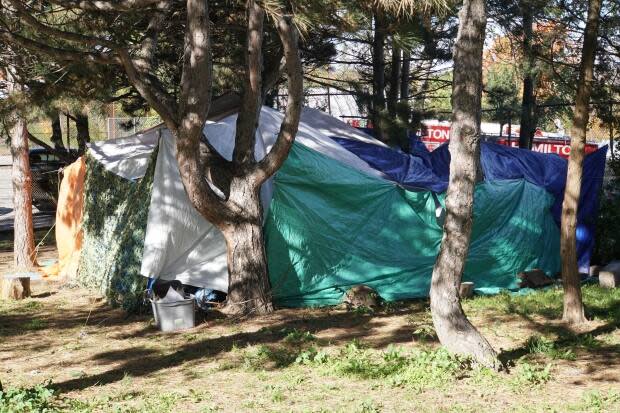City of Hamilton continues legal battle against unhoused residents over encampments

Hamilton residents who've experienced homelessness in recent years are forging ahead with a lawsuit against the city that argues evicting them from park encampments violates their charter rights.
Their case is "bolstered" by a recent court ruling in Waterloo Region, says Wade Poziomka, one of several lawyers with the Hamilton Community Legal Clinic representing 19 people in the case currently proceeding at Superior Court.
Last month, a judge blocked Waterloo from evicting residents from a vacant lot because, the court said, it didn't have enough shelter beds for people experiencing homelessness — a similar situation in Hamilton, Poziomka told CBC Hamilton.
On Thursday, the Region of Waterloo announced it would not appeal the decision, noting council had approved spending $163 million to increase shelter spots.
In Hamilton, there are 1,545 people experiencing homelessness and only 515 shelter beds, according to the city's most recent data. Last month, shelters for men and families were full.
"I'm hoping as a result of the Waterloo case, [Hamilton] city council will see the risk in this litigation and not waste taxpayer dollars fighting us, but rather sit down at the table and work with us," Poziomka said.
"The bottom line is there's not enough shelter space for people who are living homeless right now. If the city can't provide sufficient housing then is the answer, 'just let them freeze?'"

Both sides had a case management call with a judge Thursday to discuss a timeline and next steps, said Poziomka.
Over the next two months, the lawyers will gather and present their evidence and a judge will decide what can be used at a future application hearing.
The city declined to comment or say how much it has spent on related legal fees as the matter is before the courts. CBC Hamilton reached out to three downtown city councillors for comment, but did not receive responses before publication.
The city can choose to withdraw its case at anytime, with council's permission, said Poziomka.
"As always, the applicants remain open to a resolution that is in everyone's interests — individuals who are houseless, the city, and ultimately taxpayers," he said.
Dispute began during start of pandemic
The city has had a bylaw for years that bans tents in public spaces, such as parks. In the summer of 2020, a significant increase in tents appeared at different spaces around Hamilton. Doctors, lawyers and advocates got a temporary injunction barring the city from evicting encampment residents.
The previous term of council voted to challenge the injunction and won in late 2021. The city once again began enforcing its bylaw.
The 19 applicants filed their charter claim in November, 2022. They argue they have the right to live in tents on city property as there's a chronic shortage of both shelter spaces and affordable, permanent housing.
Of the applicants, 11 identify as women, including seven who are Indigenous and another who is Black and transgender.
All but two of the applications continue to experience homelessness, the court document says. The barriers they face include high rental rates, inadequate social assistance, the breakdown of relationships and domestic abuse, and complex mental health, addiction and trauma challenges that mean they can't live independently.
Most of the applicants sleep outside without tents, such as in doorways, in sleeping bags or on benches. They don't stay in shelters for many reasons, says their application. These reasons include:
Shelters operate on a first come, first served basis, meaning shelters specifically for women, youth or couples to stay together are often full.
There's a limit on the number of nights individuals can stay.
Some individuals are banned for disruptive behaviour often caused by mental health disorders and substance dependencies.
Shelters don't permit individuals to keep personal items with them or bring in pets.
A fear of assault, theft or contracting infectious disease in the congregate setting.
Encampments, on the other hand, provide shelter day and night, mitigating the risk of hypothermia, heat stroke and dehydration, the applicants argue. There's also a sense of community among residents.
City lawyers have previously argued allowing encampments would create a "secondary shelter system" and encourage people to stay in tents rather than shelters and disrupt city efforts to eventually provide them with permanent housing.
Residents living near encampments have also reported increased anxiety, trouble sleeping and concerns about drug use, garbage and violence, former city councillors have said.
Poziomka said many of the issues brought up by residents could be addressed by the city, such as arranging waste pickup and putting up washroom facilities.
He's optimistic with newly elected councillors now in office, they'll be more open to working together than in previous terms. For example, downtown Coun. Cameron Kroetsch (Ward 2) has been a vocal advocate for the city to take a new approach to encampments.
"In my view they are a very compassionate group and they care about people who are homeless in the city," Poziomka said. "I'm hoping this is a different chapter and we will be able to cooperate instead of litigate."


